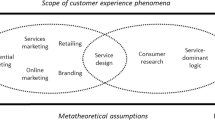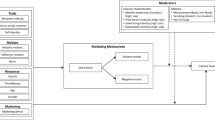Abstract
Consumer ethnocentrism (CE) is a popular construct in international marketing research and is generally measured using the CETSCALE, a reliable scale with proven predictive validity but with limited evidence about its construct validity, dimensionality and cross-cultural measurement invariance. This note addresses these gaps by reconceptualizing CE as an attitude construct consisting of three dimensions: (1) affective reaction, (2) cognitive bias and (3) behavioral preference. A revised CE scale (CES) is developed and tested using two empirical studies with adult consumers from four different countries (China, India, UK and USA), showing that CES is a reliable, valid and cross-culturally invariant scale and it explains greater variance than the CETSCALE and other similar scales, in customer evaluations and behavioral intentions for a wide range of products and services.
Similar content being viewed by others
References
Acharya, C., & Elliott, G. 2003. Consumer ethnocentrism, perceived product quality and choice – An empirical investigation. Journal of International Consumer Marketing, 15 (4): 87–115.
Anderson, J. C., & Gerbing, D. W. 1988. Structural equation modeling in practice: A review and recommended two-step approach. Psychological Bulletin, 103 (3): 411–423.
Ang, S. H., Jung, K., Kau, A. K., Leong, S. M., Pornpitakpan, C., & Tan, S. J. 2004. Animosity towards economic giants: What the little guys think. Journal of Consumer Marketing, 21 (3): 190–207.
Bagozzi, R. P., & Yi, Y. 1988. On the evaluation of structural equation models. Journal of the Academy of Marketing Sciences, 16 (1): 74–84.
Balabanis, G., Diamantopoulos, A., Mueller, R. D., & Melewar, T. C. 2001. The impact of nationalism, patriotism and internationalism on consumer ethnocentric tendencies. Journal of International Business Studies, 32 (1): 157–175.
Bawa, A. 2004. Consumer ethnocentrism: CETSCALE validation and measurement of extent. Vikalpa, 29 (3): 43–57.
Chryssochoidis, G., Krystallis, A., & Perreas, P. 2007. Ethnocentric beliefs and country-of-origin (COO) effect: Impact of country, product and product attributes on Greek consumers’ evaluation of food products. European Journal of Marketing, 41 (11/12): 1518–1544.
Cleveland, M., Laroche, M., & Papadopoulos, N. 2009. Cosmopolitanism, consumer ethnocentrism, and materialism: An eight-country study of antecedents and outcomes. Journal of International Marketing, 17 (1): 116–146.
Douglas, S. P., & Nijssen, E. J. 2003. On the use of “borrowed” scales in cross-national research: A cautionary note. International Marketing Review, 20 (6): 621–642.
Durvasula, S., Andrews, J. C., & Netemeyer, R. G. 1997. A cross-cultural comparison of consumer ethnocentrism in the United States and Russia. Journal of International Consumer Marketing, 9 (4): 73–93.
Eagly, A. H., & Chaiken, S. 1993. The psychology of attitudes. Forth Worth, TX: Harcourt Brace Jovanovich College Publishers.
Fornell, C., & Larcker, D. F. 1981. Evaluating structural equation models with unobservable variables and measurement error. Journal of Marketing Research, 18 (1): 39–50.
Good, L. K., & Huddleston, P. T. 1995. Ethnocentrism of Polish and Russian consumers: Are feelings and intentions related? International Marketing Review, 12 (5): 35–48.
Hardesty, D. M., & Bearden, W. O. 2004. The use of expert judges in scale development: Implications for improving face validity of measures of unobservable constructs. Journal of Business Research, 57 (2): 98–107.
Hsu, J. L., & Nien, H.-P. 2008. Who are ethnocentric? Examining consumer ethnocentrism in Chinese societies. Journal of Consumer Behaviour, 7 (6): 436–447.
Hu, L.-T., & Bentler, P. M. 1999. Cutoff criteria for fit indexes in covariance structure analysis: Conventional criteria versus new alternatives. Structural Equation Modeling, 6 (1): 1–55.
Jo, M.-S. 1998. Contingency and contextual issues of ethnocentrism-pitched advertisements: A cross-national comparison. International Marketing Review, 15 (6): 447–457.
Johansson, J. K., Ronkainen, I. A., & Czinkota, M. R. 1994. Negative country-of-origin effects: The case of the new Russia. Journal of International Business Studies, 25 (1): 157–176.
Khan, M. N., & Rizvi, S. R. 2008. Consumer ethnocentrism: Relevance and implications for marketers. ICFAI Journal of Consumer Behavior, 3 (1): 52–65.
Kinra, N. 2006. The effect of country-of-origin on foreign brand names in the Indian market. Marketing Intelligence & Planning, 24 (1): 15–30.
Klein, J. G., Ettenson, R., & Morris, M. D. 1998. The animosity model of foreign product purchase: An empirical test in the People’s Republic of China. Journal of Marketing, 62 (1): 89–100.
Klein, J. G., Ettenson, R., & Krishnan, B. C. 2006. Extending the construct of consumer ethnocentrism: When foreign products are preferred. International Marketing Review, 23 (3): 304–321.
Kwak, H., Jaju, A., & Larsen, T. 2006. Consumer ethnocentrism offline and online: The mediating role of marketing efforts and personality traits in the United States, South Korea, and India. Journal of the Academy of Marketing Science, 34 (3): 367–385.
LaPiere, R. T. 1934. Attitudes vs. actions. Social Forces, 13 (2): 230–237.
LeVine, R. A., & Campbell, D. T. 1972. Ethnocentrism: Theories of conflict, ethnic attitudes, and group behavior. New York: John Wiley & Sons.
Marcoux, J.-S., Filiatrault, P., & Chéron, E. 1997. The attitudes underlying preferences of young urban educated Polish consumers towards products made in Western countries. Journal of International Consumer Marketing, 9 (4): 5–29.
Netemeyer, R. G., Durvasula, S., & Lichtenstein, D. R. 1991. A cross-national assessment of the reliability and validity of the CETSCALE. Journal of Marketing Research, 28 (3): 320–327.
Nunnally, J. C. 1978. Psychometric theory. New York: McGraw-Hill.
Pereira, A., Hsu, C.-C., & Kundu, S. 2002. A cross-cultural analysis of ethnocentrism in China, India, and Taiwan. Journal of International Consumer Marketing, 15 (1): 77–90.
Reardon, J., Miller, C., Vida, I., & Kim, I. 2005. The effects of ethnocentrism and economic development on the formation of brand and ad attitudes in transitional economies. European Journal of Marketing, 39 (7/8): 737–754.
Shankarmahesh, M. N. 2006. Consumer ethnocentrism: An integrative review of its antecedents and consequences. International Marketing Review, 23 (2): 146–172.
Sharma, P. 2010. Cultural influences on consumer ethnocentrism: A multi-country investigation. Journal of Euromarketing, 19 (2&3): 175–196.
Sharma, S., Shimp, T. A., & Shin, J. 1995. Consumer ethnocentrism: A test of antecedents and moderators. Journal of the Academy of Marketing Science, 23 (1): 26–37.
Shimp, T. A., & Sharma, S. 1987. Consumer ethnocentrism: Construction and validation of the CETSCALE. Journal of Marketing Research, 24 (3): 280–289.
Steenkamp, J.-B. E. M., & Baumgartner, H. 1998. Assessing measurement invariance in cross-national consumer research. Journal of Consumer Research, 25 (1): 78–90.
Steenkamp, J.-B. E. M., Hofstede, F. T., & Wedel, M. 1999. A cross-national investigation into the individual and national cultural antecedents of consumer innovativeness. Journal of Marketing, 63 (2): 55–69.
Suh, T., & Kwon, I.-W. G. 2002. Globalization and reluctant buyers. International Marketing Review, 19 (6): 663–680.
Supphellen, M., & Grønhaug, K. 2003. Building foreign brand personalities in Russia: The moderating effect of consumer ethnocentrism. International Journal of Advertising, 22 (2): 203–226.
Supphellen, M., & Rittenburg, T. L. 2001. Consumer ethnocentrism when foreign products are better. Psychology and Marketing, 18 (9): 907–927.
Teo, P.-C., Mohamad, O., & Ramayah, T. 2011. Testing the dimensionality of Consumer Ethnocentrism Scale (CETSCALE) among a young Malaysian consumer market segment. African Journal of Business Management, 5 (7): 2805–2816.
Upadhyay, Y., & Singh, S. K. 2006. Preference for domestic goods: A study of consumer ethnocentrism. Vision, 10 (3): 59–68.
Vaughan, G., & Hogg, M. A. 2005. Introduction to social psychology. Australia: Pearson Education.
Verlegh, P. W. J. 2007. Home country bias in product evaluation: The complementary roles of economic and socio-psychological motives. Journal of International Business Studies, 38 (3): 361–373.
Wheaton, B., Muthen, B., Alwin, D. F., & Summers, G. F. 1977. Assessing reliability and stability in panel models. In D. R. Heise (Ed), Sociological methodology: 84–136. San Francisco: Jossey-Bass.
Author information
Authors and Affiliations
Corresponding author
Additional information
Accepted by Daniel Bello, Area Editor, 2 July 2014. This research note has been with the author for two revisions.
Rights and permissions
About this article
Cite this article
Sharma, P. Consumer ethnocentrism: Reconceptualization and cross-cultural validation. J Int Bus Stud 46, 381–389 (2015). https://doi.org/10.1057/jibs.2014.42
Received:
Revised:
Accepted:
Published:
Issue Date:
DOI: https://doi.org/10.1057/jibs.2014.42




